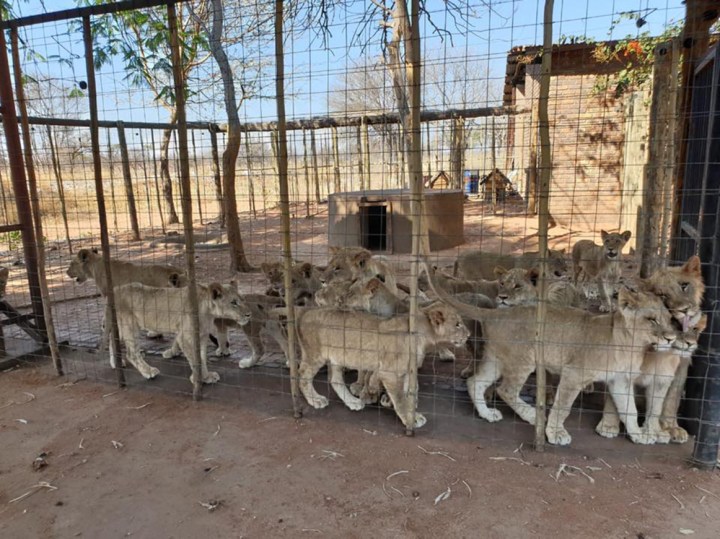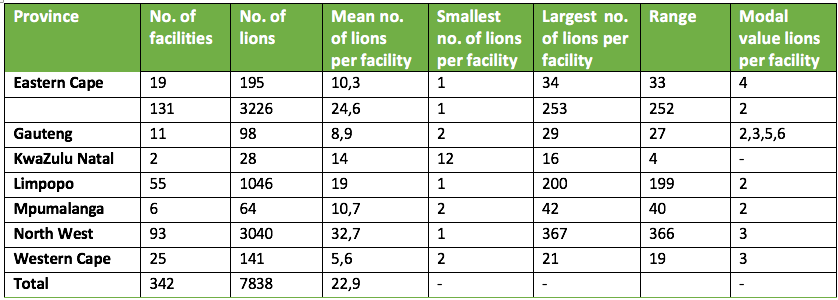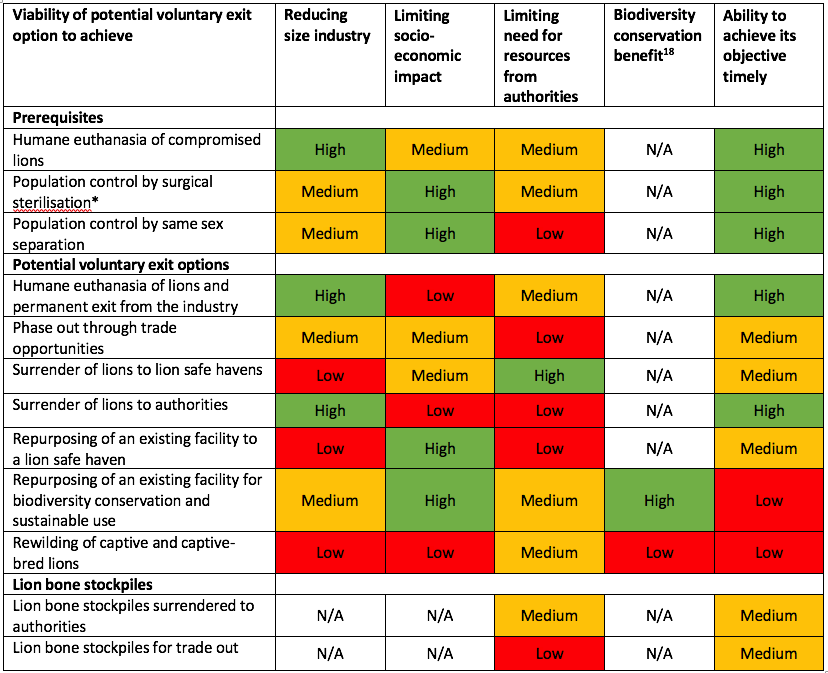WILDLIFE CONSERVATION
Government reveals roadmap to slam brakes on captive lion breeding

The environment ministry this week tabled a roadmap to end the captive lion breeding industry, but it will take a few years for the wheels to stop turning.
South Africa has the largest number of captive lions in the world — about 7,800 in 348 breeding facilities. This has to end, Environment Minister Barbara Creecy said at a press briefing this week, taking the lead from a panel of experts she appointed to formulate steps for the industry’s closure.

Captive lions and lion facilities in SA. (Table: DFFE)
The first option will be to support breeders towards voluntarily exiting the industry. This includes the euthanasia of compromised lions, population control through sterilisation, removal to safe havens or permitting hunting for two years.
Options are being explored for the burning of all stockpiled lion bones to prevent black market trade. A report on the roadmap to ending captive lion breeding recommends that no new breeding facilities be permitted.

Scoring of all potential voluntary exit options. (Table: DFFE)
For those who opt for voluntary exit, the “carrot” is that they would be permitted to use the lions for a restricted period of preferably no longer than two years. This would include captive lion hunting, live trade and domestic trade in lion skeletons, parts and derivatives for the traditional health sector.
Hunting sterilised lions could be a way of monetising euthanasia and offset a flurry of court cases by breeders opposed to the proposals. In international terms, while open season on “cheap” lions would be welcomed by hunters, it’s certain to be deeply criticised by wildlife campaigners and conservation NGOs.
The panel of experts, who formulated the hefty 250-page report to end an industry that has increasingly embarrassed South Africa, was assisted by extensive public stakeholder engagement.
Road to closure
The lion breeding industry has been allowed to grow since 1990 under a patchwork of national and provincial legislation that made control difficult. The road to its closure effectively began in 2018 when the parliamentary portfolio committee for environmental affairs held a colloquium on captive lion breeding for hunting. This was reinforced by a shocking film, Blood Lions, about canned hunting.
The colloquium’s recommendations, adopted by the National Assembly, urged the Department of Environmental Affairs to urgently review policies and legislation on the captive breeding of lions for hunting and the lion-bone trade with a view to shutting it down.
This was followed by a high-level panel (HLP) of experts, established in 2019. The HLP’s majority recommendations to effectively close the industry were accepted by the minister, which led to the establishment of the latest ministerial task team (MTT), comprising experts from diverse backgrounds, and a report on a voluntary exit from the industry.
Read more in Daily Maverick: Captive lion industry breeds crime syndicates, says new investigative report
The report noted the presence of other carnivores in captivity in SA such as tigers and jaguars and expressed concern that these may replace lions if their breeding was not restricted.

Captive predators other than lions. (Table: DFFE)
The report noted that since it began, the captive lion industry has presented multiple regulatory challenges — ethical, regulatory, conservation and economic. For these reasons, voluntary exit was just the first step in the goal of legally closing captive lion breeding. The implication is that, after the two-year phase-down period, harsher steps will follow for non-compliance.
Stockpiles of lion bones, marketed to Asian countries as a substitute in tiger-bone wine, were of particular concern for the MTT drafters. There has been no quota to legally export bones since 2019, yet during this timeframe lions have died and been hunted.
“It is thus expected that facility owners will retain various parts and derivatives in anticipation of legal trade in the future,” the report said. “The stockpile estimates are not accurate but there is still a considerable quantity of these products.
“Given the reports of the illegal exports of lion bones, parts and derivatives, the MTT recommends the rapid implementation of a government-sanctioned acquisition and mass incineration of all known lion bone stockpiles, to prevent its illegal export and signal its commitment to ending this practice.”
Private funds were being sought for the purchase of lion skeletons.
The report also recommended that permits involving captive-bred lions be restricted to 12 months, with the possibility of annual extensions, permitting a level of control over facilities. It recommended that no new facilities be licensed and no breeding be permitted.
Timelines needed
Dr Louise de Waal, director at Blood Lions, the NGO which produced the film of the same name that can rightfully claim to have started major opposition to lion breeding in South Africa, said the release of the MTT report and the publication of the Policy Position Paper were important steps towards the closure of the industry.
“However, both documents urgently need to be implemented with actual timelines for a staged approach to put an end to these unethical and cruel practices.
“With the upcoming elections, we are hugely concerned that a change in minister will impede these processes, so we need to continue to put pressure on the DFFE [Department of Forestry, Fisheries and the Environment] to follow through on their promise to stop the domestication and exploitation of our iconic species.”
Dr Neil D’Cruze of World Animal Protection said the report made some great strides forward.
“In particular, the recommendation for the mass incineration of lion bone stockpiles is of great relief given concerns that a reintroduction of lion bone exports would risk stimulating demand among Asian consumers.
“However, the opportunity for lion farmers to legally provide canned hunts and trade lion bones domestically during the phase-out window underscores the need for urgent action.”
This is a summary of the report’s recommendations:
Voluntary exit options
The following voluntary exit options were identified by the MTT:
Mandatory prerequisites
A. Humane euthanasia of compromised lions; and
B. Population control, preferably by surgical sterilisation.
Most viable voluntary exit options involving live captive and/or captive-bred lions in order of priority
- Euthanasia of all lions and permanent exit from the industry;
- Phase-out through trade opportunities for 24 months; and
- Surrender of lions to lion safe-havens.
Less viable voluntary exit options involving live captive and/or captive-bred lions
- Surrender of lions to authorities;
- Repurposing of an existing facility to a lion safe haven; and
- Repurposing of an existing facility for biodiversity conservation and sustainable use.
Viable voluntary exit options involving lion bone stockpiles
- Lion bone stockpiles surrendered to authorities; and
- Lion bone stockpiles for trade (domestic) for a period of 24 months. DM


















Burning Lion Bonesstockpiles. Now why on Earth cant we burn the rhino horn stockpiles that are being stolen and used by syndicates!!!
Burning lion bones and rhino horns is the sort of meaningless gesture favoured by the lefties. Why not sell these items and save some of the presently alive lions and rhinos from poaching?
Disgusting trade, little different from trading human organs
Rsa EMBARRASSED by lion breeding?
NEVER embarrassed by state looting, pit latrines for scholarsand children drownjng in pit latrines, 80 murders per day or people dying of thirst and hunger!!
FEACES in drinking water not embarrasses RSA ?? NOT A PROBLEM BUT LION BREEDING IS EMBARASSING?.
No values no shame by government of shame and embarrassing cabinet and MPs.
Shocked! I didn’t know BUT STOP LION BREEDING?
What is next … can’t approve rhino horn trading but stop LION breeding to start illegal trade Iin bones? Like banning legal cigarette sales and BOOSTING illegal tobacco sales which costs billions lost in revenue!!
Serious??.